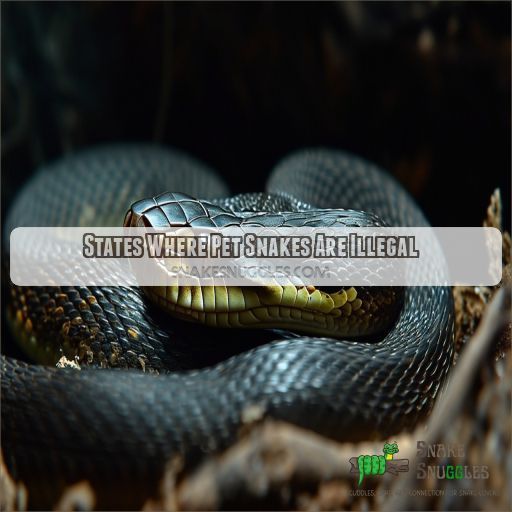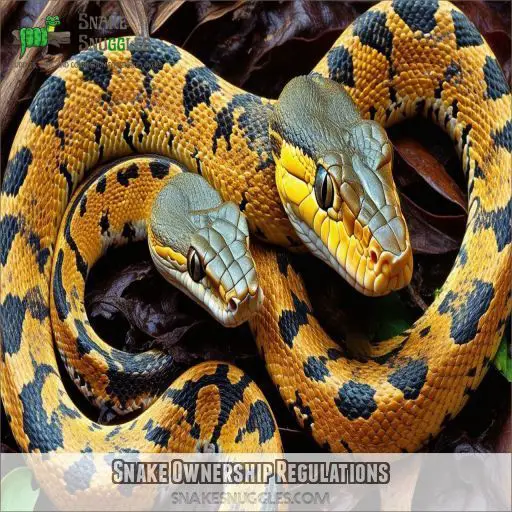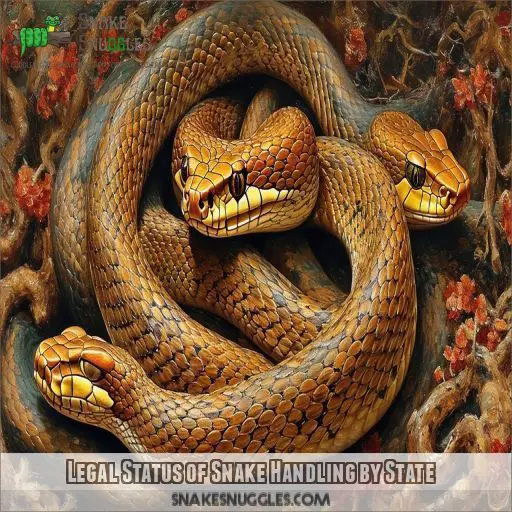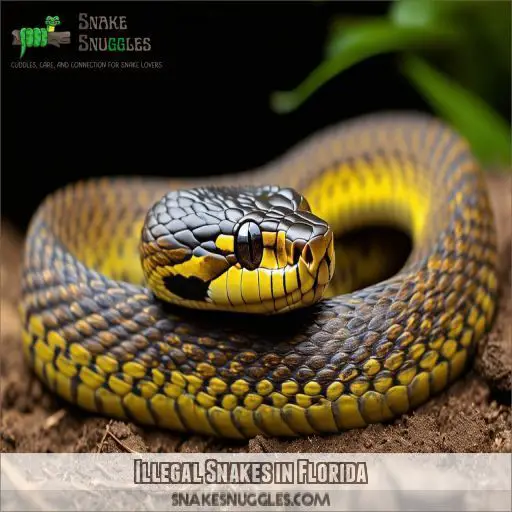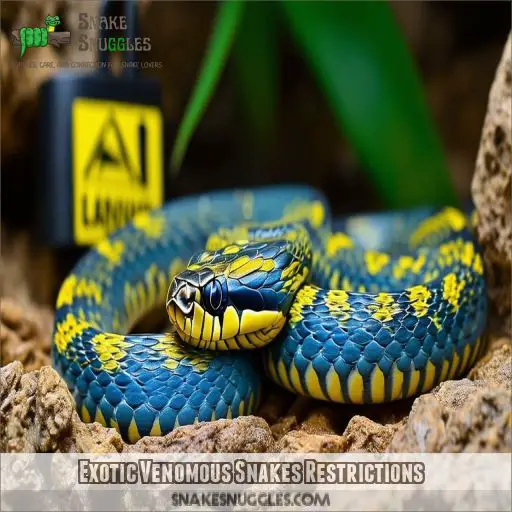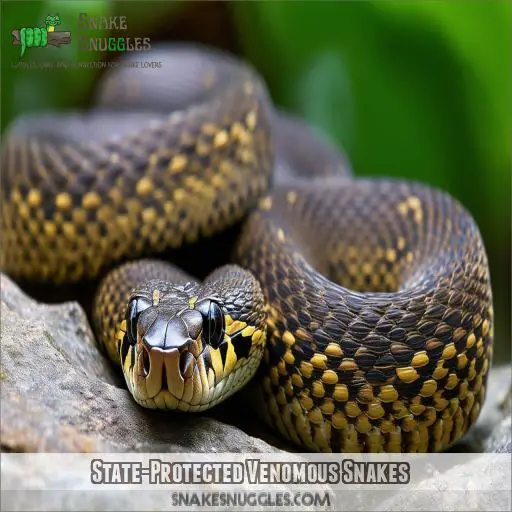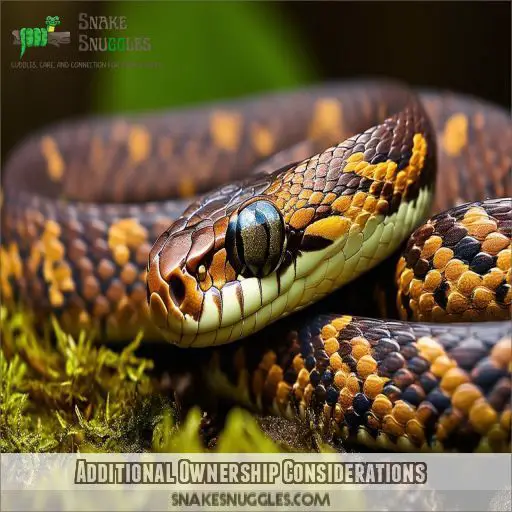This site is supported by our readers. We may earn a commission, at no cost to you, if you purchase through links.
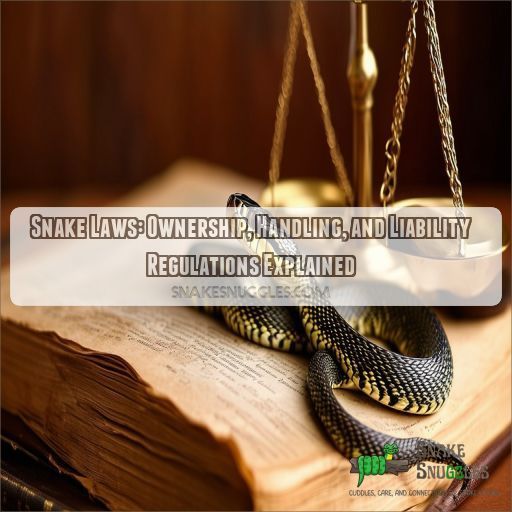
You may be aware that regulations governing snakes vary across the United States, but did you know that laws can also differ within state boundaries?
From permits and species restrictions to liability considerations, there is a labyrinth of legal complexities to decipher.
This article will guide you through the intricate web of snake laws, providing clarity on restrictions and requirements in your locality.
Whether you aspire to own a snake or are simply curious, prepare to unravel the legal intricacies surrounding these scaled creatures.
Table Of Contents
- Key Takeaways
- States Where Pet Snakes Are Illegal
- Snake Ownership Regulations
- Legal Status of Snake Handling by State
- Illegal Snakes in Florida
- Native Venomous Snakes Overview
- Exotic Venomous Snakes Restrictions
- State-Protected Venomous Snakes
- Additional Ownership Considerations
- Frequently Asked Questions (FAQs)
- What states are pet snakes illegal?
- Are you allowed to keep snakes?
- What state is snake handling legal?
- What snakes are illegal to own in Florida?
- What are the risks of owning venomous snakes?
- How do I obtain a snake permit in California?
- What happens if I own a prohibited snake?
- Are there any restrictions on selling snakes?
- Do I need a permit to handle venomous snakes?
- Conclusion
Key Takeaways
Snake laws vary from state to state. Understand the legal landscape before bringing a serpent home.
Venomous snakes may be subject to permits or complete prohibition. Avoid legal venom!
Consider housing standards, permits, and antivenom access. Ensure your snake doesn’t escape into a legal quagmire.
Insurance is your safety net. Guard yourself against financial pitfalls and legal complications.
States Where Pet Snakes Are Illegal
Understanding the legal landscape of snake ownership can be challenging, especially with the variety of local regulations across the country. Snake laws vary widely from state to state, and it’s important to familiarize yourself with the specific rules governing venomous snake handling, native snake legality, and the exotic pet trade in your area. Understanding these laws is essential for responsible ownership and snake conservation, ensuring the safety of both the public and these fascinating creatures.
Currently, Delaware, New Hampshire, and Oregon have strict prohibitions on owning pet snakes, with no permits available for prospective owners. However, other states may have more nuanced approaches, allowing non-venomous snakes without permits or requiring them for both venomous and non-venomous species.
It’s worth noting that even if your state permits snake ownership, certain species may be restricted or prohibited. For example, some states have specific laws prohibiting the ownership of venomous snakes or snakes that aren’t native to the area. So, before you decide to bring a slithering companion into your home, be sure to check your local laws to avoid any legal, or venomous, bites!
Snake Ownership Regulations
Regarding the ownership of snakes, you must navigate various regulations, including obtaining permits and adhering to species limitations. Many jurisdictions also have lists of prohibited animals, so it’s essential to be aware of what’s permissible in your area.
Permit Requirements
While some states don’t require permits for owning snakes, others have strict regulations.
Before acquiring a pet snake, you need to be aware of the permit requirements for your state.
These may include permit applications, fees, renewals, and specific regulations.
For example, Alabama requires a permit for non-native venomous reptiles, while Alaska mandates a permit for exotic venomous snakes.
Arizona and California also have permit requirements for venomous snakes, but the regulations differ between these states.
Understanding these ownership regulations is essential to ensure compliance with state laws.
Species Limitations
Snake ownership regulations vary widely, so it’s important to be aware of the legal requirements and species limitations in your state. Here are some key considerations:
- Age restrictions: Some states may have minimum age limits for snake ownership, ensuring responsible ownership and safety.
- Pet registration: Depending on your state, you may need to register your snake and obtain a permit. This helps authorities keep track of exotic pets and ensure compliance with regulations.
- Housing standards: Your snake’s enclosure must meet specific standards for size, security, and ventilation. These standards protect the snake’s well-being and prevent escapes.
- Veterinary care: Responsible ownership includes providing proper veterinary care for your snake. Regular check-ups and emergency care are essential for their health and your peace of mind.
Prohibited Animals
As an aspiring snake owner, you might be questioning prohibited species. Well, it’s time to clarify this scaly subject!
Each state has its own list of prohibited animals, so it’s critical to check the regulations in your specific region. For instance, Alabama prohibits the ownership of venomous snakes that aren’t native to the state, as well as tegus. California takes it a step further, banning crocodiles, caimans, alligators, gavials, snapping turtles, venomous snakes, and Gila monsters.
| State | Prohibited Animals | Reason |
|---|---|---|
| Alabama | Venomous snakes (non-native), Tegus | Public safety |
| California | Crocodiles, Caimans, Alligators, Gavials, Snapping Turtles, Venomous Snakes, Gila Monsters | Public safety, Wildlife conservation |
| Alaska | N/A | N/A |
Now, let’s slither on to the next topic and uncover more secrets of snake ownership!
Legal Status of Snake Handling by State
The legal status of snake handling varies considerably across different states. While some states have strict bans on owning snakes, others require permits for venomous or non-venomous varieties. Here’s what you need to know about handling protocols and local ordinances:
- Handling Protocols: When it comes to handling venomous snakes, permits are typically required, and only institutions like zoos and universities can apply for them. In states like Tennessee, there’s no religious exemption to this rule.
- Snake Behavior: Understanding snake behavior is essential for responsible ownership. Be aware of the potential health risks associated with venomous snakes, and always have antivenom readily available.
- Local Ordinances: Stay informed about the specific regulations in your state, county, and city. For example, in states like Illinois, Kansas, and Vermont, snakes can only be kept for educational or display purposes.
Illegal Snakes in Florida
Now that you’re familiar with the legal status of snake handling across the United States, let’s focus on Florida, a state with unique challenges due to its diverse ecosystem and strict regulations.
Florida has strict laws regarding snake ownership, especially concerning restricted species. The state maintains a list of prohibited snakes that are illegal to own, possess, or sell within its borders. These restrictions are in place to protect native wildlife and prevent potential ecological disasters, such as the infamous Zanesville massacre, where numerous exotic animals, including venomous snakes, wreaked havoc.
Here’s a table outlining some of Florida’s key restricted and prohibited species:
| Restricted Species in Florida | Prohibited Species in Florida |
|---|---|
| Burmese Python | Reticulated Python |
| African Rock Python | Green Anaconda |
| Yellow Anaconda | Boa Constrictor |
| Common Vine Snake | Nile Monitor Lizard |
Penalties for violations of these laws can be severe, including hefty fines and even jail time. Stay informed to avoid legal repercussions and guarantee community safety. Responsible snake ownership entails adhering to the law and prioritizing the well-being of these fascinating creatures.
Native Venomous Snakes Overview
Understanding the regulations surrounding owning native venomous snakes is essential for residents in states like Alabama, Arizona, Arkansas, and California. Each state has distinct rules to maintain public safety and appropriate handling of these potentially hazardous reptiles.
Alabama
Alabama has specific regulations in place regarding native venomous snakes. Here’s what you need to know:
- Alabama snake laws: In Alabama, it’s important to understand the regulations surrounding native venomous snakes.
- Venomous snake permits: A permit is required for non-indigenous venomous reptiles, ensuring responsible ownership and handling.
- Native species regulations: Alabama allows the possession of native animals, but with certain restrictions on venomous snakes.
- Prohibited species restrictions: Venomous snakes that aren’t native to Alabama are prohibited.
- Responsible ownership practices: It’s imperative to prioritize safety when owning venomous snakes. Secure enclosures and proper handling techniques are essential to prevent accidents and maintain compliance with Alabama’s snake laws.
Arizona
Arizona has strict regulations on exotic pet ownership, especially regarding venomous snakes.
If you wish to own one of these snakes, a permit is required.
Venomous snakes are classified as restricted species in Arizona, and their possession is carefully monitored by authorities.
Additionally, the state has laws protecting native venomous snakes, ensuring their conservation and clarifying legal liability.
Remember that proper handling and secure enclosures are crucial to prevent escapes and potential harm to yourself and the public.
Arkansas
In Arkansas, you can own exotic venomous snakes without a permit, but it’s important to practice responsible ownership. Here’s what you need to know:
- Antivenom Availability: Make sure you have access to antivenom for the specific species you own. This is essential for your safety and the well-being of those around you.
- Enclosure Security: Secure enclosures are a must. You don’t want your snakes escaping and posing a danger to your community or themselves.
- Handling Experience: handling venomous snakes requires skill and knowledge. If you’re new to exotic snake ownership, seek guidance from experienced handlers to ensure your safety and the snake’s well-being.
California
California has strict regulations in place regarding the possession of venomous snakes. The state prohibits the ownership of native venomous snakes, which includes live native rattlesnakes.
Here’s a quick overview of California’s stance on venomous snake ownership:
| State | Venomous Snake Bans | Secure Enclosures |
|---|---|---|
| California | Prohibited | N/A |
Responsible snake ownership is a priority in California, emphasizing the safety of both the public and the animals themselves.
Exotic Venomous Snakes Restrictions
Now that you’re familiar with the regulations surrounding native venomous snakes, let’s shift our focus to the restrictions imposed on their exotic counterparts.
If you’re considering owning an exotic venomous snake, it’s important to recognize the heightened responsibilities and risks associated with these unique creatures. Secure enclosures, housing standards, and responsible ownership practices become even more vital when dealing with exotic species.
Exotic venomous snakes often require specialized care and handling due to their unique characteristics and potential health risks. The availability of venom antivenom becomes a significant consideration, as these snakes may possess toxins not commonly found in native species. It’s imperative to have access to the appropriate antivenom and to be prepared to administer it in case of an emergency.
In addition to medical concerns, liability coverage takes on increased importance. The potential for costly medical expenses and legal claims rises with exotic venomous snakes, making supplemental insurance policies a prudent choice.
Lastly, regulations surrounding exotic venomous snakes can be more stringent. Federal laws, such as the Lacey Act, prohibit the illegal transport of wildlife across state lines, and certain states have specific permit requirements for exotic species. It’s important to thoroughly research the laws in your state and comply with all necessary regulations.
State-Protected Venomous Snakes
Understanding the legal complexities of venomous snake ownership can be challenging, given the diverse state-by-state regulations and federal protections in place. Some states, such as Alabama, Alaska, Arizona, and California, mandate permits specifically for exotic or venomous snakes, while others, like Arkansas, don’t impose such permit requirements.
In terms of federal protection, the Lacey Act and the Endangered Species Act play key roles. The Lacey Act prohibits the illegal transportation of venomous snakes across state lines, and the Endangered Species Act safeguards native species, including certain venomous snakes, from harm or capture. These federal laws provide an additional layer of protection and oversight, emphasizing the significance of responsible ownership.
As a snake owner, it’s your responsibility to adhere to all applicable state and federal regulations. This entails comprehending the permitting process, housing standards, and the availability of antivenom for the species you own. Remember, owning venomous snakes presents unique challenges and risks, so being proactive about safety and compliance is essential.
Additional Ownership Considerations
Owning venomous snakes comes with significant risks that you must be prepared to manage. Proper insurance coverage and strict compliance with all applicable regulations are essential for responsible snake ownership.
Ownership Risks
When owning a snake, you need to contemplate several important factors:
Antivenom protocols—as a snake owner, you should have antivenom on hand and know how to administer it; venomous bites can be life-threatening and require immediate medical attention, and treatment is costly and may result in permanent injury
Responsible enclosure design—secure enclosures are crucial to prevent escapes and ensure community safety
Community concerns
Ethical considerations
Insurance Coverage
Owning a snake comes with unique risks, and insurance is an essential part of responsible ownership.
It is crucial to protect yourself against legal claims and the financial burden of accidents or injuries your snake may cause.
Most homeowner’s and renter’s insurance policies do not cover exotic pets, so additional coverage is necessary.
This is especially important if you own a venomous snake, as their bites can be severe and require expensive treatment.
Liability insurance provides peace of mind by covering medical expenses, court costs, and other damages.
Be sure to review policy availability and coverage limits to ensure you have adequate protection.
Compliance Standards
Compliance with regulations is essential for responsible snake ownership. Here are some key considerations:
- Animal welfare: Prioritize the well-being of your snakes by providing proper care, housing, and nutrition.
- Snake safety: Maintain secure enclosures with locks to prevent escapes, protecting both your snakes and the community.
- Housing requirements: Research and adhere to state and local regulations on housing standards, including enclosure size, ventilation, and temperature control.
Frequently Asked Questions (FAQs)
What states are pet snakes illegal?
Owning venomous snakes is illegal in at least 19 states, including Tennessee, Vermont, Delaware, New Hampshire, and Oregon. Some states require permits for native and exotic species.
Are you allowed to keep snakes?
It depends on where you live. While there’s no federal law against keeping venomous snakes, state laws vary. Some states have no prohibitions, others require owners to register, and some ban ownership of venomous snakes completely.
What state is snake handling legal?
Snake handling laws vary across the US. Non-venomous snakes are legal in all states except Hawaii. Venomous snakes are legal with a permit in some states, including Indiana, Louisiana, and Mississippi.
What snakes are illegal to own in Florida?
In Florida, snakes prohibited for possession include Burmese or Indian pythons, reticulated pythons, green anacondas, and Nile monitors. Some venomous snakes are also prohibited.
What are the risks of owning venomous snakes?
Owning venomous snakes comes with legal, financial, and health risks. Their bite can be deadly, and antivenom must be administered promptly. Escaped snakes pose a danger to the public. Liability insurance is mandatory.
How do I obtain a snake permit in California?
To obtain a snake permit in California, you’ll need a Native Reptile Propagation Permit. This requires 1,000 hours of snake husbandry experience and 200 hours of handling venomous snakes. You’ll also need a letter of reference, a statement of purpose, and an emergency action plan.
What happens if I own a prohibited snake?
Slither away from prohibited snakes! Owning one could land you in a legal tangle with civil and criminal penalties, including a felony violation. You could lose the right to vote, hold office, or own a gun. Plus, you might face hefty medical and legal bills if your snake escapes or bites someone.
Are there any restrictions on selling snakes?
There are no federal laws regulating the sale of snakes, but each state has its own rules. For example, in Massachusetts, you can’t sell venomous snakes, while Nevada grants licenses to sellers based on their ability to handle and house snakes.
Do I need a permit to handle venomous snakes?
Yes, you’ll need a permit to handle venomous snakes, but the requirements vary. Some states require permits for native venomous snakes, while others don’t. You might need approvals from various departments and a high liability insurance policy.
Conclusion
Maneuvering the legal intricacies of snake ownership can be challenging.
This article illuminates the various snake laws across the United States, revealing an intricate tapestry of regulations.
From ownership limitations to liability considerations, we’ve explored the key aspects aspiring snake owners should know.
Now, armed with this knowledge, you can navigate the legal complexities and ensure compliance with local snake laws.

